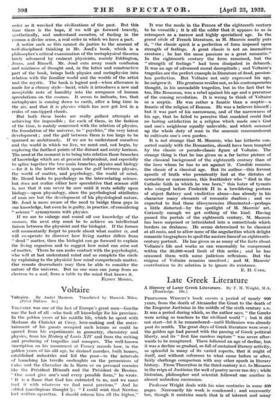Voltaire
Voltaire. By Andre Maurois. Translated by Hamish Miles. (Peter Davies. 5s.) VOLTAIRE was one of the last of Europe's great men—Goethe was the last of all—who took Ithowledge- for his province. In the golden years of his middle life, which he spent with Madame du Chatelet at Cirey, love-making and the enter- tainment of his miests occupied such leisure as could be spared from his experiments in geometry, chemistry and physics, from his-Hislory of Louis XIV and from the writing and producing of tragedies and masques. The well-known inscription on his monument at Feeney records how, in the golden years of his old age, he drained marshes, built houses, established industries and fed the poor—in the intervals of launching his terrific onslaughts on the persecutors of Galas and the Chevalier de la Barre or on personal enemies like the President Henault and the President de liroises. " One must give one's soul every possible form," he wrote. " It is a flame that • God has entrusted to us, and we must feed it with whatever we find most precious." And he added (sacrilegious thought !) " I could wish -that Newton bad written operettei. T' should esteem him all the higher." It was the mode, in the France of the eighteenth century to be versatile ; it is all the odder that it appears to us in retrospect as a narrow and highly specialized age. In the grand siicle of French literature, as M. Maurois neatly puts it, " the classic spirit is a perfection of form imposed upon strength of feelings. A' great classic is not an insensitive creature ; he has the same passions as a great romantic." In the eighteenth century the form remained, but the " strength of feelings " had been dissipated in debauch. It was an age of advanced moral decrepitude ; and Voltaire's tragedies are the perfect example in literature of dead, passion- less perfection. But Voltaire not only expressed his age, he outgrew it. His greatness resides not, as his contemporaries thought, in his unreadable tragedies, but in the fact that he too, like Rousseau, was a rebel against his age and a precursor of the coming revolution. It is wrong to think of Voltaire as a sceptic. He was rather a fanatic than a sceptic—a fanatic of the religion of Reason. He was a believer himself ; but it was part of his narrowness, and of the narrowness of his age, that he failed to perceive that ..mankind could find" no lasting satisfaction in a religion which made one's God and one's neighbour equally unlovable, and which summed up the whole duty of man in the anaemic commandment to cultivate one's own garden.
It is not strange that M. Mattrois, who has hitherto con- sorted mainly with the Romantics, should have been tempted by the classic or pseudo-classic figure of Voltaire. The strange thing is that he has given us a far better picture of the classical background of the eighteenth century than of the hero whom he has to set against 'it. Candi& remains the classic of a classical age. But its author—this fervent apostle of truth who persistently lied at the dictates of cowardice or convenience, this freethinker who " died in the Catholic faith in which he was born," this hater of tyrants who cringed before Frederick H in a bewildering posture of abject flattery and vindictive abuse—has already in his character many elements of romantic dualism ; and we expected to find these idiosyncrasies illuminated—perhaps a little distorted—by the spotlight of M. Maurois' art. Curiously enough we get nothing of the kind. Having passed the portals of the eighteenth century, M. Maurois has been surprised or intimidated into a correctitude which borders on drabness. .He seems determined to be classical at all costs, and to allow none of the angularities which delight romantic biographers to spoil the austere lines of an eighteenth- century portrait. He has given us as many of the facts about Voltaire's life and works as can reasonably be compressed within the 30,000-word limit of this series ; and he has seasoned them with some judicious reflexions. But the enigma of Voltaire remains unsolved ; and M. Maurois' contribution to its solution is to ignore its existence.
E. H. CARR.






































 Previous page
Previous page